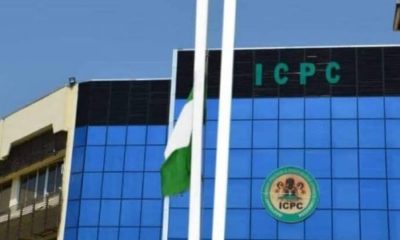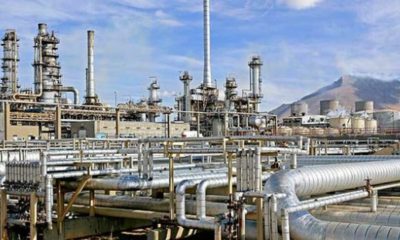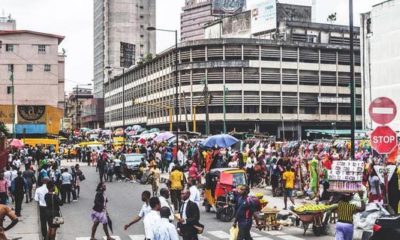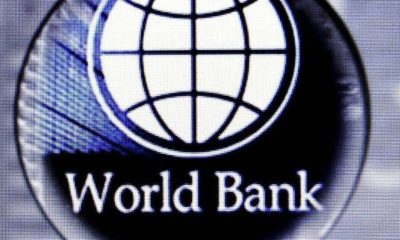Oil
Oil sector contracting, licensing processes fraught with corruption-NNRC

LAGOS-The Nigerian Natural Resource Charter (NNRC) has carpeted the process for the award of contracts and licenses for oil and gas prospecting in Nigeria, noting that it is tainted by corruption and collusion.
This is based o the char ters 2014 benchmarking report which further raises questions about the process which it disclosed is ruined with a high degree of uncertainty and political influence, a factor that has hampered the growth of the sector and the economy in general. The report, presented by the Nigerian Resource Governance Institute, NRGI, the Centre for Public Policy and Advocacy, CPPA among others, summarizes the second benchmarking of Nigeria’s petroleum sector governance against the 12 precepts of the Natural Resource Charter.
ters 2014 benchmarking report which further raises questions about the process which it disclosed is ruined with a high degree of uncertainty and political influence, a factor that has hampered the growth of the sector and the economy in general. The report, presented by the Nigerian Resource Governance Institute, NRGI, the Centre for Public Policy and Advocacy, CPPA among others, summarizes the second benchmarking of Nigeria’s petroleum sector governance against the 12 precepts of the Natural Resource Charter.
The NNRC is led by a 14-member independent, multidisciplinary expert advisory panel, comprising Mr. Odein Ajumogobia, former Minister of Petroleum and Foreign Affairs minister; Mr. Adeola Adenikinju, a Professor of Economics from the University of Ubadan; Mr. Bode Agusto, former Director General of the Budget Office and Professor Akpan Ekpo, Director General, West African Institute for Financial and Economic Management, among others.
The report said, “For instance, where a company is perceived to have the best qualifications, based on the criteria set by, for example, the Department for Petroleum Resources (DPR), such a company may not emerge as the final bid winner. The predictability of the contractual process is significantly diminished as a result.
”The report further highlighted the fact that 67 per cent of marginal fields allocated in the 2003 licensing round are yet to produce a single barrel of oil, 10 years later.Furthermore, it added, “Some licensing activity took place during the 2012-2014 period.
On 28 November 2013, the Federal Government of Nigeria (FGN) through the minister of petroleum announced the opening of second marginal oil field licensing round, with a total of 31 fields on offer – 16 of them located onshore, and the remaining 15 on the continental shelf.
”The report lamented the fact that the preparatory activities and road shows following the announcement of the 2013 marginal fields, did not lead to any allocations as the government chose to repeatedly delay the proceedings and ultimately to postpone the round all together.
The report further stated that sector roles under the Ministry of Petroleum Resources are either not explicitly known or are so fluid that the same function may cut across multiple agencies, giving rise to confusion and conflict of interests.“In monitoring and regulating the industry, for example, the DPR is not effectively independent and empowered to execute its oversight functions.
Its decisions often conflict with the interests of NNPC especially since NNPC is involved in both the regulatory and commercial aspects of the industry. For other companies operating in the industry, regulatory complications and compromises arise from the lack of adequate influence and capacity for the DPR to carry out its duties without bias,” the report noted.
In general, the report disclosed that situation in the Nigerian oil sector did not record any significant change from when the last report was presented, noting that all the indicators used in measuring Nigeria’s performance remained the same.“Since 2012, there has been no progress made with respect to the Petroleum Industry Bill, PIB.
The Bill’s provisions are not in the most ideal form, and it is stalling for a number of reasons including disagreements over its fiscal provisions, especially allegations of being a revenue bill; lack of resolution of challenges of policy discretion; and other regulatory issues with its proposed institutions,” the report stated.Mr. Dauda Garuba, Nigerian Program Coordinator, NRGI, explained that the release of the report will help shape discussions ahead of the 2015 elections, entrench change and accountability in the polity.
According to him, the Charter is designed to see how countries rich in natural resources are managing the resources for the public good.Continuing, he said, “The 2014 benchmarking exercise is not just another index of information; rather, its goal is to help Nigeria improve governance of the oil and gas sector and provide key stakeholders with a tool for action.”
Oil
NNPC Discovers Over 4,800 Illegal Pipeline Connections

The Nigerian National Petroleum Company (NNPC) Limited has revealed the detection of more than 4,800 unauthorized connections on oil pipelines within the country, painting a troubling image of the nation’s primary source of revenue.
Mele Kyari, the Group Chief Executive Officer of NNPC Ltd, communicated this information to the Senate Committee on Appropriations last Friday.
He said, “We have over 4,800 illegal connections on our pipelines. That means in some lines, within 100 kilometres of pipelines, you have as much as 300 insertions.
“Therefore, even when you produce the oil, you cannot deliver them at the required pressure and therefore the volume will also be less.”
As per the NNPC Ltd chief, individuals from various regions enter the Niger Delta, inserting unauthorized connections on pipelines in Nigeria’s oil-producing area.
This recent revelation follows a prior discovery of 295 illegal connections to the pipelines by the firm a year ago, underscoring the escalating issue of crude oil theft in Nigeria.
Two years earlier, Kyari had highlighted the country’s daily loss of 200,000 barrels of oil, amounting to $13 million due to theft and vandalism.
He further stated “We have two sets of losses, one coming from our products and the other coming from crude oil. In terms of crude losses, it is still going on. On the average, we are losing 200,000 barrels of crude every day.”
After the discovery, Nigeria’s security forces pledged to enhance security around the country’s pipelines.
To bolster this, the Federal Government granted a multi-billion naira pipelines surveillance contract to Tantita Security Services, headed by former militant leader Government Ekpemepulo, also known as Tompolo.
Despite facing criticism for this decision, Senator Heineken Lokpobiri, the Minister of State for Petroleum, remains convinced that it was the appropriate course of action.
In August, following a tour of oil facilities in the Niger Delta, Senator Heineken Lokpobiri expressed gratitude to Tantita, commissioned by NNPC Ltd, for their ongoing work.
He also hinted at plans for further extensive endeavors in the future.
In 2021, after extensive debate and delays, the Petroleum Industry Bill was finally passed to attract increased foreign investment into the oil sector through amendments to regulations, royalties, and taxes.
Oil
Dangote Refinery Set To Begin Fuel Production With First Crude Arrival

Nigeria’s colossal $19 billion Dangote Refinery, after encountering several setbacks, is on the verge of kickstarting fuel production.
This achievement is heralded by the arrival of the first crude shipment, transported by the OTIS tanker carrying 950,000 barrels of Nigeria’s Agbami crude.
S&P Global, citing industry sources and tanker tracking data on spglobal.com, reported the tanker’s departure on December 6, en route to Lekki, the nearest land port to Dangote’s offshore crude receiving terminal.
Scheduled to reach its destination around 8 PM on December 7, the arrival of this shipment signifies the commencement of crude supplies for the refinery’s operations.
Chartered by the state-owned Nigerian National Petroleum Company (NNPC), the Suezmax tanker is an emblem of the initial crude supply to Dangote’s cutting-edge refinery, as disclosed by a West African oil trader familiar with the matter in the S&P report.
Even though the refinery was officially completed in May, the absence of domestic crude feedstock had hindered oil product manufacturing.
To address this, the NNPC, holding a 20% stake in the refinery, struck an agreement to provide 6 million barrels of crude oil as feedstock to the Dangote refinery in December.
This move aims to jumpstart operations and overcome the previous impediments.
Agbami, operated by Chevron, holds a prominent position among Nigeria’s major deepwater developments, producing around 100,000 barrels per day in the central Niger Delta.
Known for its light sweet crude qualities, with a specific gravity of 47.9 API and a low sulfur content of 0.04%, Agbami produces substantial amounts of naphtha and kerosene.
NNPC has chartered additional shipments from different Nigerian offshore fields to the refinery, marking the start of a sequence of planned crude supplies for the month, as mentioned by the oil trader.
Located on the outskirts of Lagos, Nigeria’s commercial hub, the Dangote Refinery encountered repeated delays since its 2013 announcement, despite significant installation progress in 2019.
The refinery, designed to handle multiple crudes simultaneously, targets three Nigerian crude grades—Escravos, Bonny Light, and Forcados. When operating at full capacity, it aims to produce 327,000 barrels per day (b/d) of gasoline, 244,000 b/d of gasoil/diesel, 56,000 b/d of jet fuel/kerosene, and 290,000 metric tons per year of propane/LPG.
Dangote’s operations starting signify Nigeria’s hopes to lessen its reliance on gasoline imports, addressing the deficiencies of its existing refineries undergoing repairs. This shift is poised to reshape Nigeria’s oil industry, potentially leading to gasoline self-sufficiency by the 2040s.
Dangote officials anticipate an initial output of 370,000 barrels per day (b/d), emphasizing jet fuel and diesel production.
Industry analysts, however, project the refinery to reach its full operational capacity by mid-2025, although potential delays remain a looming concern.
Oil
NNPCL Sets Dec 2024 Terminal Date For Fuel Importation

The Nigerian National Petroleum Company Limited (NNPCL) has announced intentions to cease importing refined petroleum products by December 2024, anticipating full operational functionality for all national refineries by that time.
Group CEO, NNPC Ltd, Mele Kyari, shared this at a meeting with Speaker Tajudeen Abbas of the House of Representatives, who advocated for the privatisation of Nigeria’s refineries on Thursday.
Projections indicated the national oil firm’s revenue could climb to N4.5 trillion by the conclusion of 2023. Moreover, the rehabilitation of the Port Harcourt Refining Company, managed by NNPCL, was slated for completion by December of the current year.
Meanwhile, Oil marketers verified on Thursday that the Port Harcourt refinery is set for operations, potentially starting in January 2024. They emphasized that once operational, this refinery could notably reduce the prices of refined petroleum products.
During the meeting in Abuja, Kyari asserted Nigeria’s intention to cease importing refined petroleum products by 2024, envisioning the country’s emergence as a net exporter of these commodities within the same year.
He outlined the plans for launching operations at the Port Harcourt, Warri, and Kaduna refineries.
Kyari reiterated that all refineries would operate at full capacity, ultimately paving the way for Nigeria to transition into a net exporter of petroleum products by the conclusion of 2024.
He attributed the inactivity of Nigeria’s refineries over the years to the petroleum subsidy, emphasizing that the removal of this subsidy was drawing significant private-sector investments into the sector.
Kyari said “I can confirm to you that by the end of December this year, we will start the Port Harcourt refinery; early in the first quarter of 2024, we will start the Warri refinery and by the end of 2024, Kaduna refinery will come into operation.
“This is the commitment we are giving today and you can hold us accountable for this. In 2024, many of the initiatives including the rehabilitation of our refineries and also the efforts of small-scale refineries, and the upcoming Dangote refinery, will make Nigeria a net exporter of petroleum products in 2024.
“We will no longer be talking about fuel importation by the end of 2024. I am very optimistic that this will crystallise.
Kyari promised that by the conclusion of 2023, the government’s anticipated revenue from the company would reach N4.5 trillion, emphasizing NNPCL’s adherence to the Petroleum Industry Act and its commitment to delivering value to shareholders.
Recall that in October 2023, it was reported that Nigeria’s monthly spending on the importation of Premium Motor Spirit, known as petrol, had reached approximately N843 billion due to NNPCL’s cessation of oil swaps.
In July of this year, the Nigerian Midstream and Downstream Petroleum Regulatory Authority reported that during the post-deregulation period, spanning June 1 to June 28, 2023, the country’s total petrol consumption amounted to 1.36 billion litres, with an average daily consumption of 48.43 million litres.
The average ex-depot price of petrol, sourced solely from NNPCL as the importer, stands at about N580 per litre.
However, both NNPCL and oil marketers declared on Thursday that this substantial oil import expenditure would soon diminish.
They anticipated a drop once the Port Harcourt refinery commences production of refined petroleum products from January 2024, barring any unforeseen circumstances.























